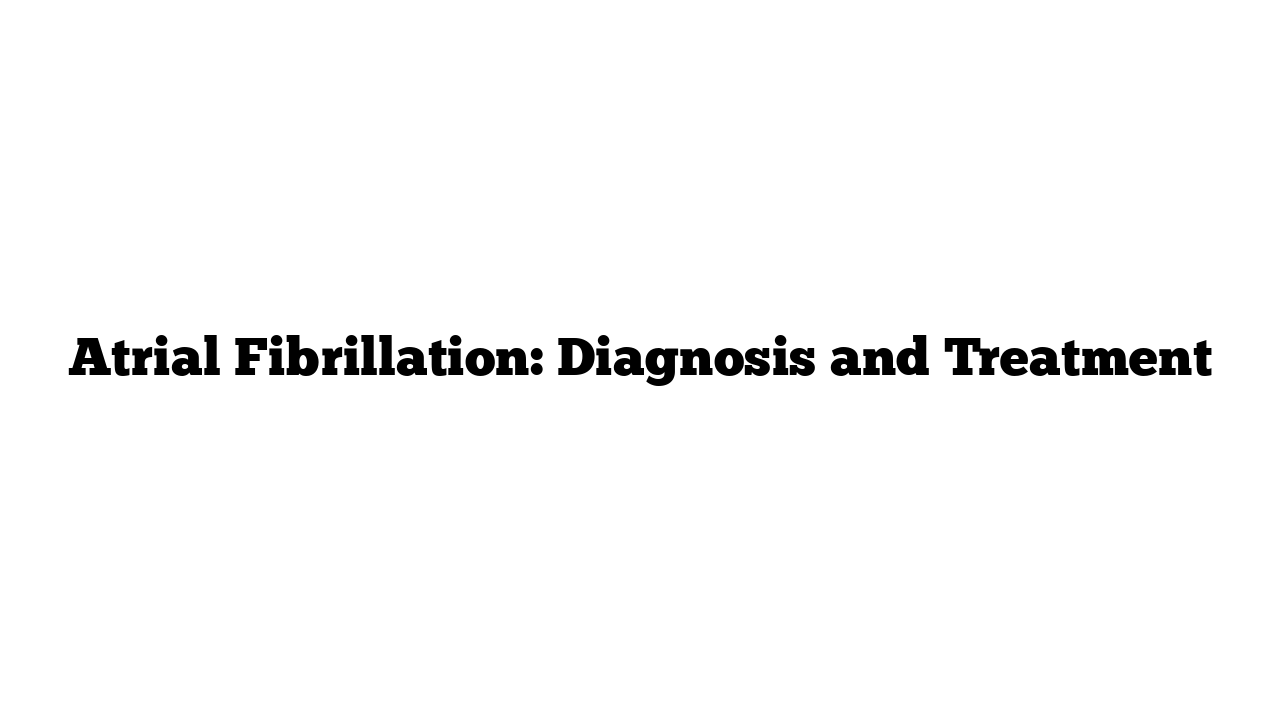Atrial fibrillation (AFib) is a common heart rhythm disorder that can lead to serious complications like stroke and heart failure. If you suspect you have AFib, it’s crucial to understand how it is diagnosed and treated.
Diagnosis
You might not realize you have AFib, as it can sometimes be discovered during a routine checkup. Your healthcare provider will review your medical history and symptoms and may conduct several tests to confirm the diagnosis and identify any underlying issues.
Tests for Diagnosing AFib:
- Blood Tests: To check for conditions that may affect your heart.
- Electrocardiogram (ECG/EKG): This quick test measures the heart’s electrical activity and helps identify irregular heart rhythms.
- Holter Monitor: A portable ECG device that records your heart’s activity over one or two days.
- Event Recorder: Similar to a Holter monitor but records only when you feel symptoms or detects an irregular heartbeat.
- Implantable Loop Recorder: Continuously records heart activity for up to three years; useful for monitoring infrequent AFib episodes.
- Echocardiogram: Uses sound waves to create images of your heart, helping to assess blood flow and heart valve function.
- Exercise Stress Tests: Evaluates how your heart performs under physical stress.
- Chest X-ray: Provides images of your heart and lungs.
Treatment
The primary goals of AFib treatment are to restore normal heart rhythm, control the heart rate, and prevent blood clots. The appropriate treatment will depend on various factors, including how long you’ve had AFib, your symptoms, and the underlying causes.
Treatment Options:
- Medications:
- Beta Blockers: Slow the heart rate.
- Calcium Channel Blockers: Control heart rate but may not be suitable for everyone.
- Digoxin: Controls heart rate, especially at rest.
- Anti-arrhythmics: Help restore normal rhythm but may have side effects.
- Blood Thinners (Anticoagulants): Prevent blood clots and reduce stroke risk (e.g., warfarin, apixaban, dabigatran).
- Cardioversion Therapy:
- Electrical Cardioversion: Uses electric shocks to restore normal rhythm.
- Drug Cardioversion: Involves administering medications to reset the heart rhythm.
- Surgery or Catheter Procedures:
- Cardiac Ablation: Destroys small areas of heart tissue causing irregular signals.
- AV Node Ablation: Destroys the connection to the AV node; a pacemaker is needed afterward.
- Maze Procedure: Creates scar tissue to disrupt irregular signals.
- Hybrid Atrial Fibrillation Ablation: Combines surgical and catheter techniques.
- Left Atrial Appendage Closure: Seals off a small heart sac where clots can form.
Lifestyle and Home Remedies
Implementing heart-healthy lifestyle changes can help prevent AFib and its complications:
- Eat Healthy: Focus on fruits, vegetables, and whole grains. Limit sugars and unhealthy fats.
- Stay Active: Aim for 30-60 minutes of physical activity most days.
- Avoid Smoking: This is a major risk factor for heart disease.
- Maintain a Healthy Weight: Being overweight increases your risk.
- Control Blood Pressure and Cholesterol: Regular check-ups and following treatment plans are essential.
- Limit Alcohol Intake: Excessive drinking can trigger AFib.
- Prioritize Sleep: Aim for 7-9 hours of quality sleep each night.
Preparing for Your Appointment
If you experience irregular heartbeats, scheduling a checkup is vital. Here’s how to prepare:
- Note any symptoms, including their onset and triggers.
- Provide a family history of heart disease or related conditions.
- List all medications and supplements you’re taking.
- Prepare questions to discuss with your healthcare provider.
Sample Questions for Your Doctor:
- What is causing my symptoms?
- What tests will I need?
- What are my treatment options?
- Are there lifestyle changes I should make?
- How often should I have follow-up appointments?
By understanding AFib, its diagnosis, and treatment options, you can work closely with your healthcare team to manage your condition effectively. Regular check-ups and proactive lifestyle changes are key to maintaining heart health.
